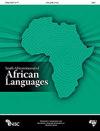COVID-19 crisis communication in Sepedi: the quality of translation by the Limpopo Department of Health
IF 0.4
0 LANGUAGE & LINGUISTICS
引用次数: 0
Abstract
AbstractThere is a paucity of literature on the importance of translating health risk messages into South Africa’s indigenous languages as a tool for crisis prevention and management. This article focuses on the quality of translations of COVID-19 information from English into Sepedi by the Limpopo Department of Health. Sepedi translations that are already available in the public domain are selected by means of the purposive sampling technique. House’s translation quality assessment (TQA) model is applied to evaluate the quality and accuracy of the translations as part of the strategic crisis response. Based on House’s model, errors in the translations are identified and classified as either ‘dimensional mismatches’ or ‘non-dimensional mismatches’. It is found that, in pursuit of covert translation, the target text from the Limpopo Department of Health does not retain the equivalent function of the source text. It is also observed that House’s model of TQA is applicable and useful in the field of translation of communications of health information. Furthermore, current studies in effective health communication miss the importance of translation during a crisis. Thus, this article bridges this gap by investigating the role of translation during the COVID-19 pandemic in South Africa. The article suggests that future research could investigate the experience of translators during the pandemic.塞佩迪的COVID-19危机沟通:林波波省卫生部的翻译质量
摘要关于将健康风险信息翻译成南非土著语言作为危机预防和管理工具的重要性,文献很少。本文重点关注林波波省卫生部将COVID-19信息从英语翻译成西班牙语的质量。通过目的抽样技术选择已经在公共领域可用的Sepedi翻译。豪斯的翻译质量评估(TQA)模型用于评估翻译的质量和准确性,作为战略危机应对的一部分。基于House的模型,翻译中的错误被识别并分类为“维度不匹配”或“非维度不匹配”。研究发现,在追求隐蔽翻译的过程中,来自林波波省卫生部的译文并没有保留源文本的等效功能。豪斯的TQA模型在卫生信息传播翻译领域具有一定的适用性和实用性。此外,目前关于有效健康沟通的研究忽视了在危机中翻译的重要性。因此,本文通过调查翻译在南非COVID-19大流行期间的作用,弥合了这一差距。这篇文章建议,未来的研究可以调查大流行期间翻译人员的经验。
本文章由计算机程序翻译,如有差异,请以英文原文为准。
求助全文
约1分钟内获得全文
求助全文
来源期刊

South African Journal of African Languages
LANGUAGE & LINGUISTICS-
CiteScore
0.50
自引率
0.00%
发文量
30
期刊介绍:
The South African Journal of African Languages is a peer-reviewed research journal devoted to the advancement of African (Bantu) and Khoi-San languages and literatures. Papers, book reviews and polemic contributions of a scientific nature in any of the core areas of linguistics, both theoretical (e.g. syntax, phonology, semantics) and applied (e.g. sociolinguistic topics, language teaching, language policy), and literature, based on original research in the context of the African languages, are welcome. The journal is the official mouthpiece of the African Language Association of Southern Africa (ALASA), established in 1979.
 求助内容:
求助内容: 应助结果提醒方式:
应助结果提醒方式:


